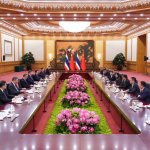
Gene Sharp, American scholar and expert in non-violent civil disobedience, famously theorized that the power of rulers is derived from the consent of subjects. Non-violent action, such as protests and public demonstrations are methods of withdrawing consent and challenging persistent problems of authoritarian behavior, such as oppression and dictatorship. Real power is concentrated in groups and institutions, which provide an opposing force against a ruler. In addition to the military and various branches of government, segments of society, the media, civil society, and an array of political and social organizations are also critical pillars that allow leaders to hold and maintain power.

In Thailand’s recent reform protests, the most prominent voice has been a coalition of students, youth, and activists. However, if the wider goal is to broaden the potential for mass mobilization and topple other pillars that grant the Thai regime a hold on power, greater attention must be paid to expanding the base of support, especially among marginalized communities and informal institutions.
For example, labor unions should be recruited to play a larger role in the Thai reform movement. In the rush to bring back and reclaim elements of the past, the labor movement’s role in toppling prior military dictatorships should not be overlooked. While banned from formal existence dating back to 1958 by Field Marshal Sarit, the labor movement was central in the overthrow of the brutal Thanom Kittikachorn regime in 1973. It was under a more democratic government—although brief—that allowed for a surge in organized labor in Thailand. The death of two labor activists in Nakhon Pathom province, Chumporn Thummai and Wichai Ketsriphongsa, who were hanged on September 25, 1976 while protesting the return of Thanom from exile, was the spark that lit that year’s protest.
The current pro-reform movement should also understand how the labor movement was stifled after the 1976 coup d’état, when the National Administrative Reform Council (NARC), a pro-military council that replaced the parliamentary system, admonished unions and curtailed efforts to allow workers to join them.
Today, according to the International Labor Organization (ILO), just about two percent of the Thai workforce is organized into unions, and less than one percent of private enterprises had unions as of 2015. Union membership is scattered throughout Thailand’s 76 provinces. However, in the absence of formal unions, there are more ad-hoc, informal groupings of labor. Exiled former Prime Minister Thaksin Shinawatra was able to capitalize on his association with taxi cab drivers, who became mobile billboards for his populist campaigns.
There is an opportunity for pro-democracy and pro-reform organizers to mobilize informal associations of migrant and informal sector workers. In addition to the ten formal demands made of the military-backed government, reformers should champion the causes of workers, whose social and economic inequalities are unparalleled anywhere else in the world–and recently made international headlines through the persecution of activist Andy Hall, who documented the plight of thousands of workers, including child labor.
As many Thai people have understood and appreciated the call for greater political freedoms and have rejected government intrusions on civil liberties, one large population should receive far greater attention and inclusion—Malay Muslims in the restive southern Thai provinces.
Muslims in the Deep South should not be overlooked—and as some have already suggested, the push for democracy can bring about peace in the region. The history of animosity between military regimes of the past, as well contemporary struggles with the Thaksin government are well documented, and trace back to Thailand’s assimilation of the former Sultanate of Patani in the 18th Century. Malay Muslims are no stranger to economic and social disparities and are wary of a protracted conflict that has lasted generations.
Progress toward productive peace talks in the South have completely stagnated under Prime Minister Prayut Chan-o-cha. Whereas previous administrations were willing to discuss autonomy and recognition of local customs and religious practices, the current regime has been slow to respond and has stalled talks altogether. Only a responsive, inclusive democracy can restore the kind of inclusion and participatory dialogue that is necessary to secure a lasting peace. A regime that surveils Muslim students in the interests of national security also erects barriers to dialogue and hinders trust-building among parties—aside from the obvious infringement on religious freedom.
Pro-reform leaders have a great deal of catching up to do. This past November, Thai Muslims, organized by the Central Islamic Council of Thailand, gathered in Bangkok to proclaim their allegiance to the nation, religion, and monarchy—three pillars of Thailand’s long-held state ideology. The right-leaning Democrat Party has dominated the southern Thai provinces by appealing to a sense of morality, loyalty, and cultural ideals. Thaksin’s hardline approach to the southern conflict did the democracy movement no favors. Significant political inroads must be established to broaden the potential mobilization of people beyond the boundaries of Bangkok.
Including these historically-marginalized groups would help debunk royalist claims that the pro-reform movement is a largely boisterous, yet undiversified group of urban Bangkok youth. Including marginalized groups like informal workers, unions, and Muslims from the southern provinces could also foster greater communication between other marginalized communities and enable a more inclusive platform of grievances and a more diverse slate of demands of the Prayut regime.
It isn’t that other communities have been excluded, as the LGBTQ communities have made rallies, according to some supporters, “lighter, funnier, and less stressful.” Their presence has also shown what a shared spotlight can mean—an increased focus on same-sex marriage and gender equality—a goal made more achievable under a government with democratic traditions and robust institutions. It’s time for reform leaders to expand even further.






